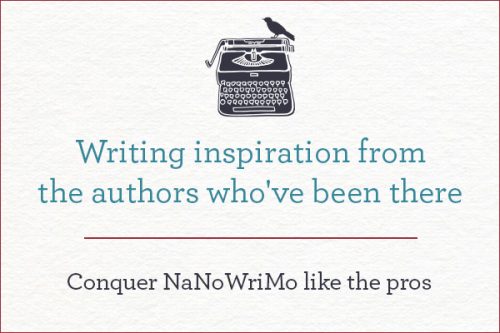This article was written by Lorraine Berry and originally appeared on Signature Reads.
As writers, we can be our own worst enemies. We may have dozens of reasons why we are not writing. Sometimes, these barriers may feel insurmountable, but James Clear argues in
Atomic Habits that those barriers can be breached through a series of one percent changes to our habits. “The most practical way to change
who you are is to change
what you do,” he says, and he offers a series of small steps to developing a writing habit.
Clear provides methods that help pinpoint those habits that are ineffective, and a large variety of tactics to create effective habits that will change what we do. His book contains clear instructions on how to develop writing as a habit, one that will feel as automatic as brushing your teeth or that first cup of coffee in the morning.
Here are five effective habits.
Habit #1: In order to encourage inspiration to strike, set up a time to meet with it.
James Clear cites a British study that showed that those who write down specific times when they will practice their new habit have the highest success rate. For writers, creating such an “implementation intention” would involve writing down a sentence that looks like this: “I will write for (period of time) at (time of day) at (location).” So, for example, “I will write for 30 minutes at 3 p.m. at the kitchen table.” By sitting down each day at 3, you accustom your brain to this new habit. Once your brain can count on you to keep your new habit, you may find that new ideas and inspiration are waiting for you.
Habit #2: If writing is important to you, create an environment that encourages you to write.
Our environment can create barriers to practicing our new habits. If your habit is to sit on the sofa to watch TV, and you had intended to write while sitting on the sofa, then the TV may prove to be too big a temptation. Instead, choose a place to write that isn’t associated with another habit. If you live in a tiny space with few options, then designate a specific place to write. It doesn’t have to be a different room. In a studio apartment, you may decide to use a different chair or to set up a small writing corner. You will attach writing to that particular place, so if you’re in that space, your brain will expect you to write. Environmental clues can be used to help reinforce your new habit.
Habit #3: Create temptations that reward you for your new habit of writing.
Habits are developed because our brain has a dopamine-driven feedback loop. It is the anticipation of the reward that causes the release of dopamine that makes us feel good. In fact, anticipation releases more dopamine than actually doing the thing we craved or wanted. You can use a habit you already have (getting up early, taking the dogs for a walk, drinking coffee in the morning) to attach the habit you are trying to develop to a reward that your brain anticipates. In this way, the habit you are developing is sandwiched between a daily habit you do anyway, and is followed by something you want. Clear provides readers with methods for identifying both the already established habits and also the things that individuals consider to be rewards. His system might look something like this:
- After (current habit), I will (habit I need to develop).
- After (habit I need to develop), I will (habit I want).
So, if you walk your dog every day after breakfast, and you need to write, but you also want to spend time on social media, you could do this:
- After I walk the dog, I will write for 30 minutes.
- After I write for 30 minutes, I will go on social media.
If going on social media has kept you from writing, this creates a system where social media is the reward you use to encourage yourself to write.
Habit #4: Make it easy to practice the habit of writing.
Wasting time is easy: we carry distractions in our pocket or give it pride of place in our living rooms. If we want to develop the practice of writing, we have to remove barriers to our practice. One way is to prime your environment with cues to your habit. So, if your intention is to write in the morning at the kitchen table, before you go to bed at night, lay out your writing implements —laptop or pen and paper. I take it further by making writing easier all the time: I carry a small notebook in my purse, have one in my car’s glove box, and leave several throughout my house. This way, it’s as easy to write as it is to pick up the phone.
Habit #5: Start with the Two-Minute Rule for new habits and continue from there.
Maybe you’re afraid that you’ll fail in some way because your committed writing time is too long. Clear suggests creating a ritual and following the Two Minute Rule as a way to prime yourself for your new habit. If your goal is to write at night, you can help to cement the habit into your head by attaching it to a ritual of your choosing, whether that’s a cup of herbal tea or changing into comfy clothes. Each evening, as you engage in the ritual, your brain will anticipate that you are about to sit down and write. Your ritual primes your habit. Next, write for two minutes. If you feel done, stop. Clear argues that two minutes is usually enough to get past any initial resistance.
Clear has filled
Atomic Habits with hints like these that enable us to change the habits we dislike and replace them with habits that show who we are. In order to be a writer, you must develop the habit of writing, even if it’s one word at a time. As Margaret Atwood reminds us, “A word after a word after a word is power.”
Writing at the table © Andrew Neel/Unsplash.
 It’s true, it takes a certain compulsive drive to be a writer, but a lot of us still fall victim to procrastination or outright avoidance, particularly when the writing feels like a Sisyphean struggle — and in my experience, it feels like that a great deal of the time. It may be helpful to know that giving in to that urge to do anything other than writing in those moments is not entirely because of a lack of discipline. You may be able to put the blame on your brain. The New York Times recently reported on a study that found our brains can trick us into feeling an urgency to do less important, more immediately rewarding tasks like, perhaps, cleaning up that backlog of emails rather than taking on more difficult projects in which the finish is a long way off, as is the case with that novel that’s been languishing on your desk or knocking around in your head — hence the need for scheduling.
There is the element of ritual in a good schedule, which can be a comfort. Showing up at an appointed time to a familiar place and performing your task — there’s equilibrium in it. But don’t think your schedule has to be perfect or meet some writerly ideal. It just needs to be habitual and workable for you. If a two-hour block after putting the kids to bed is all you have, then go with it. Early mornings before rushing off to your day job? Set the alarm accordingly. Many of us are quite adaptable when we need to be. In my case, I prefer working early mornings, but I usually only have time in the late afternoons and on weekends, so that is when I write. I also prefer quiet but, having worked in busy newsrooms for my entire professional life, I can handle a bit of noise.
So, find the time and — crucially — keep it for yourself and your writing projects alone. You are more apt to do this if you think of writing as what it is: work. And whether your workplace is at an office desk, the kitchen table, or a counter in a coffeehouse, showing up there without fail or distractions must be a priority. That may mean skipping that impromptu party, missing that movie with your friends, leaving that email backlog to another day. Writing is part of your routine. Your daily ritual. Treat it that way.
And even on those days when you can’t get motivated (which will be more days than you might imagine), clock in. Keep writing, even when what you put on the page proves unusable or even shockingly inadequate (which will also happen more often than you might imagine). With every sentence, you’re finding your way. You’re working on craft. And even when you can’t come up with anything at all, stay with it. As you sit drumming your fingers on your forehead or staring off into the middle distance, puzzling over how to fill that blank page, you’re plumbing the depths of creativity. You’ll figure out what comes next. And if you don’t figure it out during that workday, then maybe you will on the next one. Or the next. And here, I should probably make a note of this important fact: Inspiration works on its own schedule. So keep yours. I promise, the two of you will meet up in due time.
Check out Anissa’s book here:
It’s true, it takes a certain compulsive drive to be a writer, but a lot of us still fall victim to procrastination or outright avoidance, particularly when the writing feels like a Sisyphean struggle — and in my experience, it feels like that a great deal of the time. It may be helpful to know that giving in to that urge to do anything other than writing in those moments is not entirely because of a lack of discipline. You may be able to put the blame on your brain. The New York Times recently reported on a study that found our brains can trick us into feeling an urgency to do less important, more immediately rewarding tasks like, perhaps, cleaning up that backlog of emails rather than taking on more difficult projects in which the finish is a long way off, as is the case with that novel that’s been languishing on your desk or knocking around in your head — hence the need for scheduling.
There is the element of ritual in a good schedule, which can be a comfort. Showing up at an appointed time to a familiar place and performing your task — there’s equilibrium in it. But don’t think your schedule has to be perfect or meet some writerly ideal. It just needs to be habitual and workable for you. If a two-hour block after putting the kids to bed is all you have, then go with it. Early mornings before rushing off to your day job? Set the alarm accordingly. Many of us are quite adaptable when we need to be. In my case, I prefer working early mornings, but I usually only have time in the late afternoons and on weekends, so that is when I write. I also prefer quiet but, having worked in busy newsrooms for my entire professional life, I can handle a bit of noise.
So, find the time and — crucially — keep it for yourself and your writing projects alone. You are more apt to do this if you think of writing as what it is: work. And whether your workplace is at an office desk, the kitchen table, or a counter in a coffeehouse, showing up there without fail or distractions must be a priority. That may mean skipping that impromptu party, missing that movie with your friends, leaving that email backlog to another day. Writing is part of your routine. Your daily ritual. Treat it that way.
And even on those days when you can’t get motivated (which will be more days than you might imagine), clock in. Keep writing, even when what you put on the page proves unusable or even shockingly inadequate (which will also happen more often than you might imagine). With every sentence, you’re finding your way. You’re working on craft. And even when you can’t come up with anything at all, stay with it. As you sit drumming your fingers on your forehead or staring off into the middle distance, puzzling over how to fill that blank page, you’re plumbing the depths of creativity. You’ll figure out what comes next. And if you don’t figure it out during that workday, then maybe you will on the next one. Or the next. And here, I should probably make a note of this important fact: Inspiration works on its own schedule. So keep yours. I promise, the two of you will meet up in due time.
Check out Anissa’s book here:
 It’s true, it takes a certain compulsive drive to be a writer, but a lot of us still fall victim to procrastination or outright avoidance, particularly when the writing feels like a Sisyphean struggle — and in my experience, it feels like that a great deal of the time. It may be helpful to know that giving in to that urge to do anything other than writing in those moments is not entirely because of a lack of discipline. You may be able to put the blame on your brain. The New York Times recently reported on a study that found our brains can trick us into feeling an urgency to do less important, more immediately rewarding tasks like, perhaps, cleaning up that backlog of emails rather than taking on more difficult projects in which the finish is a long way off, as is the case with that novel that’s been languishing on your desk or knocking around in your head — hence the need for scheduling.
There is the element of ritual in a good schedule, which can be a comfort. Showing up at an appointed time to a familiar place and performing your task — there’s equilibrium in it. But don’t think your schedule has to be perfect or meet some writerly ideal. It just needs to be habitual and workable for you. If a two-hour block after putting the kids to bed is all you have, then go with it. Early mornings before rushing off to your day job? Set the alarm accordingly. Many of us are quite adaptable when we need to be. In my case, I prefer working early mornings, but I usually only have time in the late afternoons and on weekends, so that is when I write. I also prefer quiet but, having worked in busy newsrooms for my entire professional life, I can handle a bit of noise.
So, find the time and — crucially — keep it for yourself and your writing projects alone. You are more apt to do this if you think of writing as what it is: work. And whether your workplace is at an office desk, the kitchen table, or a counter in a coffeehouse, showing up there without fail or distractions must be a priority. That may mean skipping that impromptu party, missing that movie with your friends, leaving that email backlog to another day. Writing is part of your routine. Your daily ritual. Treat it that way.
And even on those days when you can’t get motivated (which will be more days than you might imagine), clock in. Keep writing, even when what you put on the page proves unusable or even shockingly inadequate (which will also happen more often than you might imagine). With every sentence, you’re finding your way. You’re working on craft. And even when you can’t come up with anything at all, stay with it. As you sit drumming your fingers on your forehead or staring off into the middle distance, puzzling over how to fill that blank page, you’re plumbing the depths of creativity. You’ll figure out what comes next. And if you don’t figure it out during that workday, then maybe you will on the next one. Or the next. And here, I should probably make a note of this important fact: Inspiration works on its own schedule. So keep yours. I promise, the two of you will meet up in due time.
Check out Anissa’s book here:
It’s true, it takes a certain compulsive drive to be a writer, but a lot of us still fall victim to procrastination or outright avoidance, particularly when the writing feels like a Sisyphean struggle — and in my experience, it feels like that a great deal of the time. It may be helpful to know that giving in to that urge to do anything other than writing in those moments is not entirely because of a lack of discipline. You may be able to put the blame on your brain. The New York Times recently reported on a study that found our brains can trick us into feeling an urgency to do less important, more immediately rewarding tasks like, perhaps, cleaning up that backlog of emails rather than taking on more difficult projects in which the finish is a long way off, as is the case with that novel that’s been languishing on your desk or knocking around in your head — hence the need for scheduling.
There is the element of ritual in a good schedule, which can be a comfort. Showing up at an appointed time to a familiar place and performing your task — there’s equilibrium in it. But don’t think your schedule has to be perfect or meet some writerly ideal. It just needs to be habitual and workable for you. If a two-hour block after putting the kids to bed is all you have, then go with it. Early mornings before rushing off to your day job? Set the alarm accordingly. Many of us are quite adaptable when we need to be. In my case, I prefer working early mornings, but I usually only have time in the late afternoons and on weekends, so that is when I write. I also prefer quiet but, having worked in busy newsrooms for my entire professional life, I can handle a bit of noise.
So, find the time and — crucially — keep it for yourself and your writing projects alone. You are more apt to do this if you think of writing as what it is: work. And whether your workplace is at an office desk, the kitchen table, or a counter in a coffeehouse, showing up there without fail or distractions must be a priority. That may mean skipping that impromptu party, missing that movie with your friends, leaving that email backlog to another day. Writing is part of your routine. Your daily ritual. Treat it that way.
And even on those days when you can’t get motivated (which will be more days than you might imagine), clock in. Keep writing, even when what you put on the page proves unusable or even shockingly inadequate (which will also happen more often than you might imagine). With every sentence, you’re finding your way. You’re working on craft. And even when you can’t come up with anything at all, stay with it. As you sit drumming your fingers on your forehead or staring off into the middle distance, puzzling over how to fill that blank page, you’re plumbing the depths of creativity. You’ll figure out what comes next. And if you don’t figure it out during that workday, then maybe you will on the next one. Or the next. And here, I should probably make a note of this important fact: Inspiration works on its own schedule. So keep yours. I promise, the two of you will meet up in due time.
Check out Anissa’s book here:

















